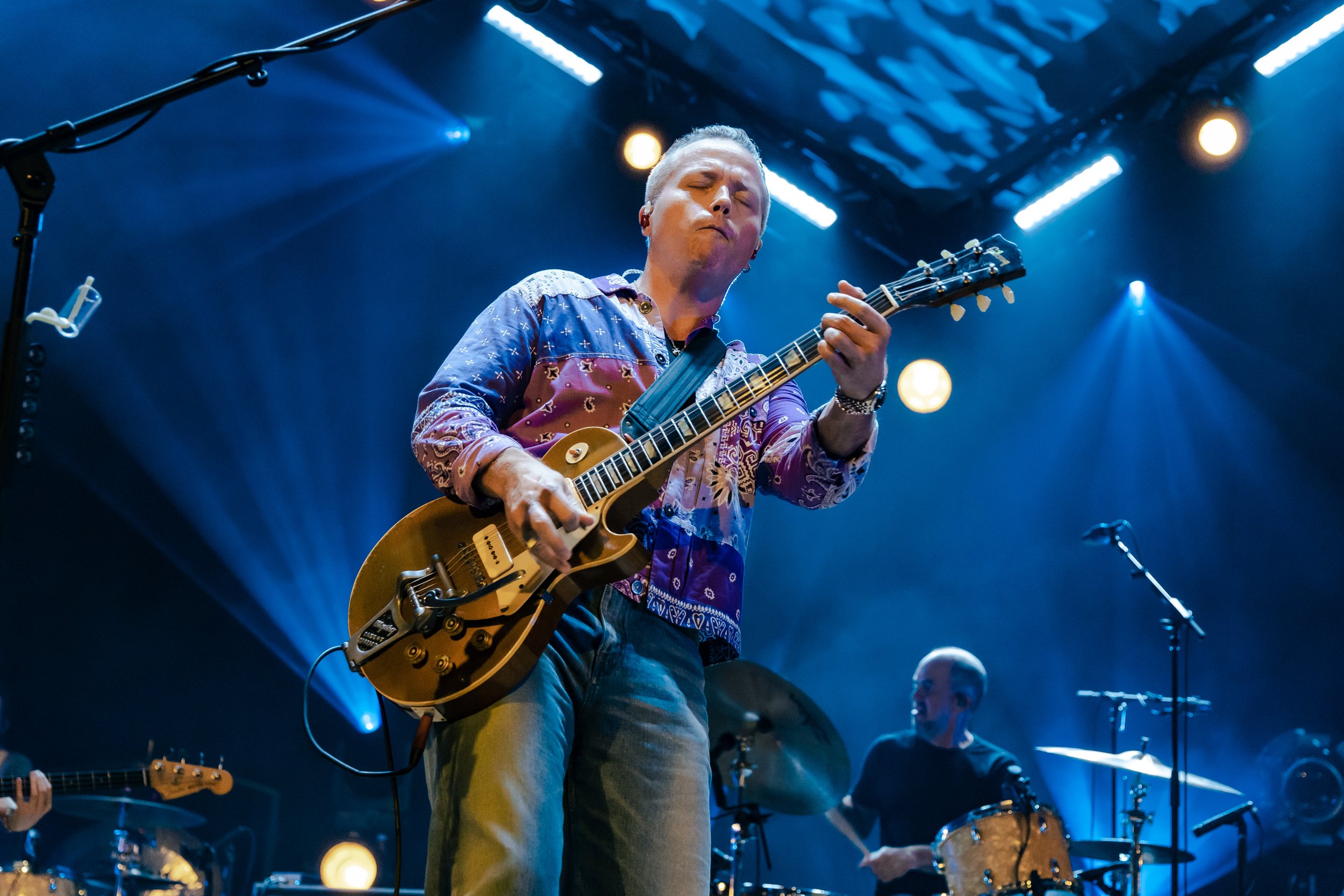Jason Isbell Celebrates the Power of Rock at Orpheum

Jason Isbell, by Victoria Conway
The Americana leaned into his inner big rock last Friday night in support of his new album with the 400 Unit, “Weathervanes.”
I wonder how audiences hear Jason Isbell around the country. His southern-ness has been baked in since he first appeared as a Drive-By Trucker, and it remains an essential part of his presentation. His haircut would have been at home driving a tractor or performing on the Opry stage decades ago. His voice is unmistakably Alabama, and he dots his songs with details that ground his songs’ stories in a world he knows.
I wonder if in other parts of the country he’s perceived as a unicorn, a thoughtful, progressive Southerner from a MAGA-friendly part of the country that still actively works to restrict voting rights for people of color. At the Orpheum on Friday night, he was a reassuring presence. New Orleans is a blue oasis in a red state, and Isbell reminded us that there are more people like us out there, even if it doesn’t always feel like that.
Nothing in Isbell’s show was explicitly political, though. He said little beyond telling us the names of band members, thanking us, and telling us New Orleans never disappoints, but it’s hard not to feel the political backdrop these days, particularly with an artist as reflective as Isbell. At a time when so many people are satisfied with easy answers that can’t stand the gentlest scrutiny, it’s reassuring to hear someone whose songs deal with uncomfortable truths, for him as well as the rest of us. Isbell can be a little earnest—maybe the natural byproduct of regular self-scrutiny—but on Friday night he balanced it with the rock ’n’ roll power of big guitars.
Sadler Vaden, Chad Gamble and Jason Isbell at the Orpheum, by Victoria Conway
Isbell was on tour with his band the 400 Unit in support of Weathervanes, their most recent album, and the songs all benefited from the live presentation. “Save the World” is anthemic enough on record, but the guitars made something as theoretically mundane as a personal response to a school shooting--welcome to the 2023 definition of “mundane”—more urgent and dramatic. Isbell followed it with “King of Oklahoma,” also from Weathervanes, and an addict coming to grips with what has become of his life got a sympathetic treatment, in part from the gentle loveliness of the melody but also from the full arena rock treatment, complete with two guitar solos and Isbell meeting guitarist Sadler Vaden at the middle of the stage in power stances on either side of drummer Chad Gamble.
Gestures like those now seem dated in many contexts including a lot of arena rock shows, where they feel like hokey reiterations of tropes that haven’t been meaningful since 1974. Isbell makes them pay off because he has made so many deliberate choices in his music that you can’t help but read the presentation as intentional too. These motions have always played like celebrations of rock ’n’ roll, and through the transitive property of rock ’n’ roll, the people in his songs benefit from the rub and their struggles feel even more dramatic than the words convey.
Jason Isbell and Anna Butterss in concert in New Orleans, by Victoria Conway
The show had a lot of rock, more than you might expect from someone so known for his words, but Isbell never let the show settle too comfortably in one mode. Big, sing-along songs like “Alabama Pines” and “Super 8” were balanced by the grim realities of “Elephant” and “If We Were Vampires,” the latter facing what happens to lovers who grow old together. “Maybe we’ll get 40 years together,” he sang. “But one day I’ll be gone / or one day you’ll be gone.” It’s hard to imagine anybody in crowd who didn’t hear a private anxiety folded into one of Isbell’s songs, and while the realization that you’re not alone doesn’t make the fear go away, it’s reassuring to know you’re not alone.
The quieter moments gave his show gravity, but the big guitar moments gave it shape. They covered Drivin’ and Cryin’s “Honeysuckle Blue,” and Friday night it looked like he had found the common song on everybody’s playlists, a southern rock classic after Lynyrd Skynyrd southern rock era. Perhaps because I don’t have formative memories of drinking in the SEC, Drivin’ and Cryin’ is a blind spot for me, but If they sounded as heavy and nimble Isbell’’s version, I might care more. The set closer, “Miles,” took its classic rock gestures to the extreme by including an organ solo, a guitar solo, and a mid-song musical digression until a gong brought them back to the primary riff.
That tension between the stories of lives being lived right now and arena rock moves as old as Keith Richards kept the show from settling into any easy place. It wasn’t just two hours of the feels, but it was never simply simulated power moves. Add to that an artist from a part of the country defined by tension and you get a really compelling show.
Creator of My Spilt Milk and its spin-off Christmas music website and podcast, TwelveSongsOfChristmas.com.








